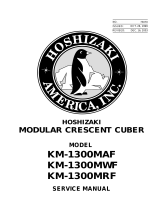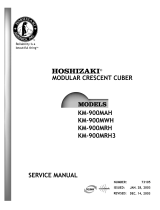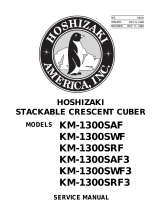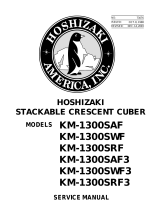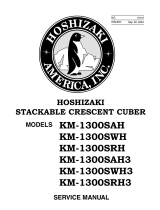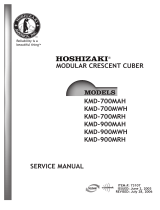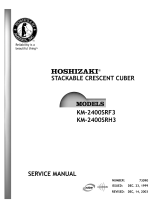Page is loading ...

NO:
73092
ISSUED:
JULY 11, 2000
KM-1300NRF
MODEL
SERVICE MANUAL
HOSHIZAKI
MODULAR CRESCENT CUBER
DEC. 17, 2003
REVISED:

2
HOSHIZAKI AMERICA, INC.
618 Highway 74 South
Peachtree City, GA 30269
Attn: HOSHIZAKI Technical Support Department
Phone: 1-800-233-1940 Technical Service
(770) 487-2331
Fax: (770) 487-3360
NOTE: To expedite assistance, all correspondence/communication MUST include the following
information:
• Model Number
• Serial Number
• Complete and detailed explanation of the problem
IMPORTANT
Only qualified service technicians should attempt to service or maintain this icemaker.
No such service or maintenance should be undertaken until the technician has
thoroughly read this Service Manual.
HOSHIZAKI provides this manual primarily to assist qualified service technicians in the
service and maintenance of the icemaker.
Should the reader have any questions or concerns which have not been satisfactorily
addressed, please call or write to the HOSHIZAKI Technical Support Department for
assistance.

3
Please review this manual. It should be read carefully before the icemaker is serviced or
maintenance operations are performed. Only qualified service technicians should service
and maintain the icemaker. This manual should be made available to the technician prior
to service or maintenance.
CONTENTS
PAGE
I. SPECIFICATIONS .................................................................................................... 5
1. KM-1300NRF (Remote air-cooled)...................................................................... 5
2. CONDENSING UNIT, URC-12F ......................................................................... 6
II. GENERAL INFORMATION ...................................................................................... 8
1. CONSTRUCTION............................................................................................... 8
2. CONTROLLER BOARD ...................................................................................... 9
[a] SOLID-STATE CONTROL ............................................................................ 9
[b] CONTROLLER BOARD ................................................................................ 9
[c] SEQUENCE ................................................................................................ 13
[d] CONTROLS AND ADJUSTMENTS ........................................................... 16
[e] CHECKING THE CONTROLLER BOARD ................................................. 20
3. BIN CONTROL ................................................................................................. 21
[a] CAPACITIVE PROXIMITY SENSOR .......................................................... 21
[b] EXPLANATION OF OPERATION ............................................................... 21
[c] TROUBLESHOOTING ................................................................................ 22
III. TECHNICAL INFORMATION............................................................................... 24
1. WATER CIRCUIT AND REFRIGERANT CIRCUIT............................................ 24
2. WIRING DIAGRAM........................................................................................... 25
3. TIMING CHART ................................................................................................ 26
4. PERFORMANCE DATA ................................................................................... 28
IV. SERVICE DIAGNOSIS ........................................................................................ 29
1. NO ICE PRODUCTION..................................................................................... 29
2. EVAPORATOR IS FROZEN UP ....................................................................... 32
3. LOW ICE PRODUCTION.................................................................................. 33
4. ABNORMAL ICE............................................................................................... 33
5. OTHERS ........................................................................................................... 33

4
V. REMOVAL AND REPLACEMENT OF COMPONENTS...........................................34
1. SERVICE FOR REFRIGERANT LINES ...............................................................34
[a] REFRIGERANT RECOVERY......................................................................... 34
[b] EVACUATION AND RECHARGE................................................................... 34
2. BRAZING .............................................................................................................35
3. REMOVAL AND REPLACEMENT OF COMPRESSOR.......................................36
4. REMOVAL AND REPLACEMENT OF DRIER .....................................................37
5. REMOVAL AND REPLACEMENT OF EXPANSION VALVE ...............................38
6. REMOVAL AND REPLACEMENT OF HOT GAS VALVE,.......................................
LINE VALVE AND GAS VALVE..........................................................................39
7. REMOVAL AND REPLACEMENT OF EVAPORATOR........................................40
8. REMOVAL AND REPLACEMENT OF CONDENSING PRESSURE ........................
REGULATOR (C.P.R.) - REMOTE AIR-COOLED MODEL ONLY .................... 41
9. REMOVAL AND REPLACEMENT OF THERMISTOR........................................42
10. REMOVAL AND REPLACEMENT OF FAN MOTOR...........................................43
11. REMOVAL AND REPLACEMENT OF WATER VALVE ......................................44
12. REMOVAL AND REPLACEMENT OF PUMP MOTOR........................................44
13. REMOVAL AND REPLACEMENT OF SPRAY TUBES ......................................45
VI. MAINTENANCE AND CLEANING INSTRUCTIONS...............................................46
1. PREPARING THE ICEMAKER FOR LONG STORAGE ......................................46
2. CLEANING PROCEDURE ...................................................................................48
[a] CLEANING PROCEDURE .............................................................................49
[b] SANITIZING PROCEDURE ...........................................................................51
3. MAINTENANCE ...................................................................................................52

5
I. SPECIFICATIONS
1. KM-1300NRF (Remote air-cooled)

6
2. CONDENSING UNIT
URC-12F

7
SPECIFICATIONS
MODEL: URC-12F
EXTERIOR
DIMENSIONS (W x D x H)
REFRIGERANT CHARGE
URC-12F
WEIGHT
CONNECTIONS
REFRIGERANT
ELECTRICAL
CONDENSER
HEAD PRESSURE CONTROL
AMBIENT CONDITION
Galvanized Steel
35 - 11/16” x 15-11/16” x 21-15/16”
(907.2 x 398 x 557.8 mm)
R404A 4 lbs. 7 oz. (2000 g)
Net 80 lbs. (36 kg)
Shipping 87 lbs. (39 kg)
One Shot Couplings (Aeroquip)
Permanent Connection
Air-cooled
Condensing Pressure Regulator
Min. -20°F - Max. +122°F
(-29°C to +50°C)
Outdoor use

8
II. GENERAL INFORMATION
1. CONSTRUCTION
[a] KM-1300NRF

9
2. CONTROLLER BOARD
[a] SOLID-STATE CONTROL
1) A HOSHIZAKI exclusive solid-state control is employed in KM-1300NRF
Modular Crescent Cubers.
2) A Printed Circuit Board (hereafter called “Controller Board”) includes a stable and
high quality control system.
3) All models are pretested and factory-adjusted.
[b] CONTROLLER BOARD
CAUTION
1. Fragile, handle very carefully.
2. A controller board contains integrated circuits, which are susceptible to
failure due to static discharge. It is especially important to touch the
metal part of the unit when handling or replacing the board.
3. Do not touch the electronic devices on the board or the back of the board
to prevent damage to the board.
4. Do not change wiring and connections. Especially, never misconnect
K3, K4 and K5, because the same type of connector is used for the
Thermistor (white), the Float Switch (black) and the Bin Control (red).
5. Do not fix the electronic devices or parts on the board in the field.
Always replace the whole board assembly when it goes bad.
6. Do not short out power supply to test for voltage.
PART NUMBER TYPE
2A1410-01 HOS-001A (Control Products)
Features of Control Products “E” Controller Board
1) Maximum Water Supply Period - 6 minutes
Water Solenoid Valve opening, in the Defrost (Harvest) Cycle, is limited by the defrost
timer. The Water Valve cannot remain open longer than the maximum period. The
Water Valve can close in less than six minutes if the defrost cycle is completed.

10
2) Defrost Timer
The defrost cycle starts when the Float Switch opens and completes the freeze cycle.
But the Defrost Timer does not start counting until the Thermistor senses 48°F at the
Evaporator outlet. The period from the end of the freeze cycle up to the point of the
Thermistor's sensing varies depending on the ambient and water temperatures.
3) High Temperature Safety - 127 ± 7°F
The temperature of the suction line in the refrigerant circuit is limited by the High
Temperature Safety.
During the defrost cycle the Evaporator temperature rises. The Thermistor senses
48°F and starts the Defrost Timer. After the Defrost Timer counts down to zero,
the normal freeze cycle begins. If the Evaporator temperature continues to rise,
the Thermistor will sense the rise in temperature and at 127 ± 7°F the Thermistor
operates the High Temperature Safety.
This High Temperature Safety shuts down the circuit and the icemaker automatically
stops. To reset the safety, turn the power off and back on again.
This High Temperature Safety protects the unit from excessive temperature. The Control
Board will Beep every 3 seconds. The white Reset Button on the Control Board must be
pressed with power on to reset the Safety.
4) Low Water Safety
If the Pump Motor is operated without water, the mechanical seal can fail. To prevent this
type of failure, the Controller Board checks the position of the Float Switch at the end of
the initial one minute water fill cycle and at the end of each defrost cycle.
If the Float Switch is in the up position (electrical circuit closed), the Controller Board
changes to the ice making cycle. If the Float Switch is in the down position (electrical
circuit open), the Controller Board changes to a one minute water fill cycle before starting
the ice making cycle. This method allows for a Low Water Safety shut down to protect the
Water Pump from mechanical seal failure.
For water-cooled model, if the water is shut off, the unit is protected by the High Pressure
Switch.
5) High Voltage Cutout
The maximum allowable supply voltage of this icemaker is limited by the High Voltage Cutout.
If miswiring (especially on single phase 3 wire models) causes excessive voltage on the
Controller Board, the High Voltage Cutout shuts down the circuit in 3 seconds and the
icemaker automatically stops. When the proper supply voltage is resumed, the icemaker
automatically starts running again. The Control Board will signal this problem using 7 Beeps
every 3 seconds.
6) LED Lights and Audible Alarm Safeties
The red LED indicates proper control voltage and will remain on unless a control voltage
problem occurs. At startup a 5 second delay occurs while the board conducts an internal
timer check. A short beep occurs when the power switch is turned ON or OFF.

11
The green LED’s 1-4 represent the corresponding relays and energize and sequence 5
seconds from initial start-up as follows:
Sequence Step LED’s on Length: Min. Max. Avg.
1 Minute Fill Cycle LED4 60 sec.
Harvest Cycle LED1, 4, & 2 2 min. 20 min. 3-5 min.
Freeze Cycle LED1 5 min. 60 min. 30-35 min.
Reverse Pump Out LED1, 3, & 2 10 sec. 20 sec. Factory set.
{LED 1 – Comp; LED 2 - HGV/CFM; LED 3 – PM; LED 4 - WV}
The built in safeties shut down the unit and have alarms as follows:
1 beep every 3 sec. = High Evaporator Temperature >127 ° F.
Check for defrost problem (stuck HGV or relay), hot water entering unit, stuck headmaster,
or shorted thermistor.
2 beeps every 3 sec. = Defrost Back Up Timer. Defrost >20 minutes.
Orange LED marked 20 MIN energizes.
Check for open thermistor, HGV not opening, TXV leaking by, low charge, or inefficient
compressor.
3 beeps every 3 sec. = Freeze Back Up Timer. Freeze > 60 minutes.
Yellow LED marked 60 MIN energizes.
Check for F/S stuck closed (up), WV leaking by, HGV leaking by, TXV not feeding
properly, low charge, or inefficient compressor.
4 beeps every 3 sec. = Short Circuit between the K4 connection on the control board and
the bin control relay. Check connections and replace wire harness if necessary.
5 beeps every 3 sec. = Open Circuit between the K4 connection on the control board and
the bin control relay. Check connections and replace wire harness if necessary.
To manually reset the above safeties, depress white alarm reset button with the power
supply ON.
6 beeps every 3 sec. = Low Voltage. Voltage is 92 Vac or less.
7 beeps every 3 sec. = High Voltage. Control voltage > 147 Vac ±5%.
The red LED will de-energize if voltage protection operates.
The voltage safety automatically resets when voltage is corrected.
The Output Test switch “S3” provides a relay sequence test. With power OFF, place S3
ON and switch power to ICE. The correct lighting sequence should be none, 2, 3, 4, 1, & 4,
normal sequence every 5 seconds. S3 should remain in the “OFF” position for normal
operation.
The application switch located between relay X3 & X4 must be set to match the original
board application. Place this switch in the ALP position if there is no white wire supplied

12
(Control Products HOS-001A Board)
to the K1 connector. If there is a white wire, place the switch in the C position. If this
switch is placed in the wrong position, either the compressor contactor will remain
energized with the control switch OFF, or the unit will not start.
The dip switches should be adjusted per the adjustment chart published in the Tech
Specs book. 8 must remain in the OFF position.

13
4. Defrost Timer stops counting.
Defrost cycle is completed and freeze cycle
starts.
[c] SEQUENCE
1st Cycle
1. Unit energized and Control Switch to “ICE”
position. Water supply cycle starts.
2. After 1 minute.
Defrost cycle starts.
IMPORTANT
Water Valve
opening is limited
to 6 minutes.
5. After the first 5 minutes in freeze cycle.
Ready to complete freeze cycle when Float
Switch circuit opens.
IMPORTANT
1. Board never accepts defrost completion signal
within the first 2 minutes in defrost cycle.
2. Defrost cycle time is limited to 20 minutes even
if Defrost Timer does not stop counting.
3. Thermistor reads 48°F.
Defrost Timer starts counting.
IMPORTANT
Board never accepts freeze completion signal
within the first 5 minutes in freeze cycle.

14
2nd Cycle and after with pump drain
IMPORTANT
Freeze cycle time is limited to 60 minutes even
if Float Switch does not open.
1. Float Switch opens and signals to complete
freeze cycle.
Drain timer starts counting.
2. Drain timer stops counting.
Pump drain is completed
3. Thermistor reads 48° F.
Defrost Timer starts
counting.
IMPORTANT
Water Valve
opening is limited to 6
minutes.
5. After the first 5 minutes in freeze cycle.
Ready to complete freeze cycle when Float
Switch circuit opens.
4. Defrost Timer stops counting.
Defrost cycle is completed and freeze cycle
starts.
IMPORTANT
Board never accepts freeze completion signal
within the first 5 minutes in freeze cycle.
IMPORTANT
1. Board never accepts defrost completion
signal within the first 2 minutes in defrost
cycle.
2. Defrost cycle time is limited to 20 minutes
even if Defrost Timer does not stop counting.
&

15
2nd Cycle and after with no pump drain
IMPORTANT
Freeze cycle time is limited to 60 minutes even
if Float Switch does not open.
1. Float Switch opens and signals to complete
freeze cycle.
2. Thermistor reads 48° F.
Defrost Timer starts counting.
IMPORTANT
Water Valve
opening is limited to 6
minutes.
4. After the first 5 minutes in freeze cycle.
Ready to complete freeze cycle when Float
Switch circuit opens.
3. Defrost Timer stops counting.
Defrost cycle is completed and freeze cycle
starts.
IMPORTANT
Board never accepts freeze completion signal
within the first 5 minutes in freeze cycle.
IMPORTANT
1. Board never accepts defrost completion
signal within the first 2 minutes in defrost
cycle.
2. Defrost cycle time is limited to 20 minutes
even if Defrost Timer does not stop counting.

16
[d] CONTROLS AND ADJUSTMENTS
The Dip Switch is factory-adjusted to the following positions:
Switch Nos. 1 and 2:
Used for adjustment of the Defrost Timer.
The Defrost Timer starts counting when the Thermistor reads a certain temperature
at the Evaporator outlet.
Switch Nos. 3 and 4:
Used for adjustment of the Drain Timer.
When a freeze cycle is completed, the Pump Motor stops, and the icemaker
resumes operation in 2 seconds. Then the Pump Motor drains the Water Tank
for the time determined by the Drain Timer. The Drain Timer also determines
the time to restrain completion of a defrost cycle, i.e. the minimum defrost time.
Switch Nos. 5 and 6:
Used for adjustment of the Drain Counter.
The Pump Motor drains the Water Tank at the frequency determined by the Drain
Counter.
Switch No. 7:
Used for Capacitive Proximity Bin Control.
Switch No. 8:
Used only for checking the Controller Board. Usually set in OFF position.
Switch Nos. 9 and 10:
Used for adjustment of Freeze Timer.
The Freeze Timer determines maximum
freeze cycle time. Upon termination of
Freeze Timer, machine initiates the
harvest cycle. After 2 consecutive timer
terminations, machine will shut down,
possibly indicating a problem.
DIP SWITCH NO. 1 2 3 4 5 6 7 8 9 10
KM-1300NRF OFF OFF ON ON ON ON ON OFF OFF OFF

17
1) Defrost Control
A thermistor (Semiconductor) is used for a defrost control sensor. The resistance
varies depending on the Suction Line temperatures. The Thermistor detects the
temperature of the Evaporator outlet to start the Defrost Timer. No adjustment is
required. If necessary, check for resistance between Thermistor leads, and visually
check the Thermistor mounting, located on the Suction Line next to the Evaporator
outlet.
Temperature (°F) Resistance (kΩ)
0 14.401
10 10.613
32 6.000
50 3.871
70 2.474
90 1.633
Check a thermistor for resistance by using the following procedures.
(i) Disconnect the connector K3 on the board.
(ii) Remove the Thermistor. See “V. 11. REMOVAL AND REPLACEMENT OF
THERMISTOR.”
(iii) Immerse the Thermistor sensor portion in a glass containing ice and water for 2 or 3
minutes.
(iv) Check for a resistance between Thermistor leads.
Normal reading is within 3.5 to 7 kΩ. Replace the Thermistor if it exceeds the normal
reading.
2) Defrost Timer
No adjustment is required under normal use, as the Defrost Timer is adjusted to the
suitable position. However, if necessary when all the ice formed on the Evaporator
does not fall into the bin in the harvest cycle, adjust the Defrost Timer to a longer setting
by adjusting the Dip Switch (No. 1 & 2) on the Controller Board.
SETTING TIME
Dip Switch Dip Switch
No. 1 No. 2
OFF OFF 60 seconds
ON OFF 90 seconds
OFF ON 120 seconds
ON ON 180 seconds

18
3) Drain Timer
The Drain Timer is factory-adjusted, and no adjustment is required.
SETTING TIME
Dip Switch Dip Switch
No. 3 No. 4 T1 T2
OFF OFF 10 seconds 150 seconds
ON OFF 10 seconds 180 seconds
OFF ON 10 seconds 120 seconds
ON ON 20 seconds 180 seconds
T1: Time to drain the Water Tank
T2: Time to restrain defrost completion
4) Drain Counter
CAUTION
Do not adjust the Drain Counter, or the Evaporator may freeze up.
The Drain Counter is factory-adjusted to drain the Water Tank every 10 cycles, and no
adjustment is required. However, where water quality is bad and the icemaker needs a
pump drain more often, the Drain Counter can be adjusted as shown in the table below:
SETTING FREQUENCY
Dip Switch Dip Switch
No. 5 No. 6
OFF OFF every cycle
ON OFF every 2 cycles
OFF ON every 5 cycles
ON ON every 10 cycles

19
6) Bin Control
CAUTION
Dip Switch No. 7 must be set to the ON position. If No. 7 is set to the OFF
position, the machine will run continuously, causing a freeze-up condition.
No adjustment is required. The Bin Control is factory-adjusted.
5) Freeze Timer
CAUTION
Adjust to proper specification, or the unit may not operate correctly.
Two new dip switches numbered 9 and 10 have been added to the improved “E” board
to better prevent possible freeze ups. These settings come factory set to the default
setting of 60 min. (OFF, OFF). Check the adjustment chart published in the Tech
Specs for proper settings. If the old board does not have these two dip switches, (only
8 instead of 10), leave setting as OFF, OFF.
SETTING TIME
Dip Switch Dip Switch
No. 9 No. 10
OFF OFF 60 min.
ON OFF 70 min.
OFF ON 50 min.
ON ON 60 min.

20
[e] CHECKING THE CONTROLLER BOARD
1) Visually check the sequence with the icemaker operating.
2) Visually check the Controller Board by using the following procedures.
(i) Adjust the Defrost Timer to minimum position.
Disconnect the Thermistor from the Controller Board.
Connect a 1.5 kΩ - 3.5 kΩ resistor to the Connector K3 (pins #1 and #2), and energize
the unit.
After the 1 minute ± 5 second water supply cycle and the 2 minute ± 10 second defrost cycle,
the unit should start the freeze cycle.
(ii) After the above step (i), disconnect the Float Switch leads from the Controller Board
within the first 5 minutes of the freeze cycle.
The unit should go into the defrost cycle after the first 5 minutes ± 20 seconds of
the freeze cycle.
(iii) Reconnect the Float Switch Connector to the Controller Board. After the first 5
minutes of the freeze cycle, disconnect the Float Switch leads from the Controller
Board.
At this point, the unit should start the defrost cycle.
(iv) After Step (iii), de-energize the unit and confirm that the Defrost Timer is in the
minimum position. Disconnect the resistor from the Controller Board, and ener-
gize the unit.
After the 1 minute water supply cycle, the defrost cycle starts.
Re-connect a 1.5 kΩ - 3.5 kΩ resistor to the Connector K3 (pins #1 and #2) after
the first 2 minutes of the defrost cycle. The unit should start the freeze cycle after
1 minute ± 5 seconds from the resistor connection.
/
